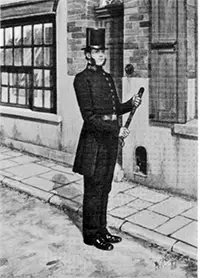The Founding of the London Metropolitan Police
The Metropolitan Police Force of London dates to the early 19th Century and is largely the creation of Sir Robert Peel, who went on to become Prime Minister. 
Peel had served as chief secretary for Ireland in 1812–1818 and laid the groundwork for a police force there. He became Home Secretary of the United Kingdom in 1821 and made a name for himself revolutionizing the penal system. Some private police forces had existed before this time, but they were rare and rarely organized. Among Peel's initiatives were a focus on preventing crime and reforming criminals, rather than relying strictly on terror and punishment. Prison reform was also a priority for Peel, and he achieved this by centralizing prison supervision. The Metropolitan Police Act of 1829 established the police force of London. The members of the police, named after him, were called "Peelers" or "Bobbies." One of his more famous quotes was "The police are the public and the public are the police." Members of the police had to physically fit, literate, aged 20–27, and 5'7" tall. Of course they had to have no criminal record. They worked all but five days a year, which they took as unpaid leave. Their salary was £1 a week. They had to wear their uniforms even when they were off duty and could not vote in elections. 
They wore top hats and blue coats with tails. Peel believed that his policemen should not appear to be soldiers, so the uniforms were blue (not the red worn by the Army). They carried a pair of handcuffs, a wooden truncheon, and a wooden rattle; they would use the last to raise the alarm (with the rattle being replaced by a whistle a few decades later). Guns were used sparingly and were not usually carried. The first members of the new police force started their patrols on Sept. 29, 1829. The initial force exceeded 1,000, with 895 constables patrolling the streets, 88 sergeants overseeing them, 20 inspectors doing separate work, eight superintendents overseeing all of the men in uniform, and two commissioners sitting over the top of everyone. Peel enunciated Nine Principles of Policing:
|
|
Social Studies for Kids
copyright 2002–2024
David White




